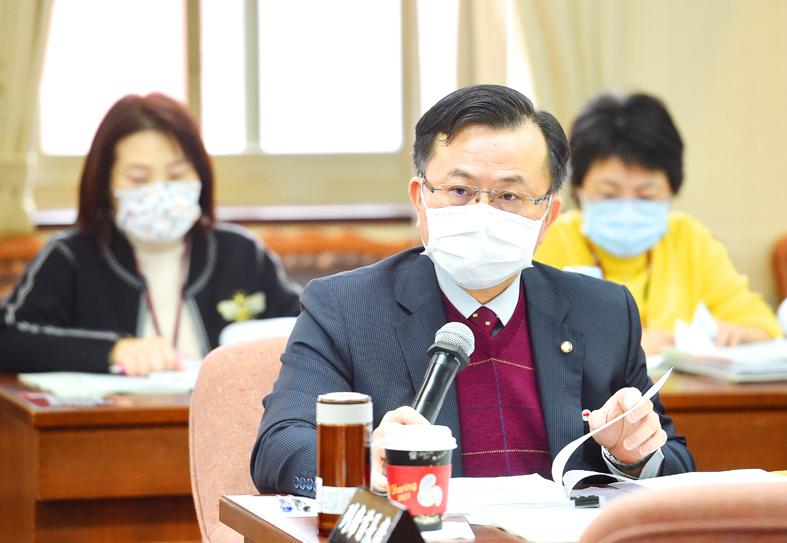Google and Facebook would face stricter rules of accountability under a digital communications bill to be considered by the legislature, National Communications Commission (NCC) Chairman Chen Yaw-shyang (陳耀祥) said yesterday.
The commission on Wednesday unveiled the framework of the bill at a news conference in Taipei, saying that it was designed to regulate online platforms, as well as Internet service providers and caching service providers.
The bill would divide the operators of digital platforms into “online platform service providers” and “designated online platform service providers,” with the latter representing companies with a stronger market influence, which would have to meet more obligations, the commission said.

Photo: Peter Lo, Taipei Times
Although the NCC said that the rules for designated online platform service providers would focus on businesses with large user bases and significant market power, the bill stoked fears online that the commission would target influential platforms in Taiwan, such as the Line messaging app or the Professional Technology Temple (PTT) bulletin board system.
At a meeting of the legislature’s Transportation Committee yesterday, Chen was asked by Chinese Nationalist Party (KMT) Legislator Hung Meng-kai (洪孟楷) to elaborate on how the commission would determine which entities were designated online platform service providers.
“We mainly follow the principle stated in the European Commission’s proposed digital services act, in which larger platforms are obligated to bear more responsibilities. Under such a principle, Google and Facebook would definitely be regulated, while other platforms would be regulated based on their attributes,” Chen said.
NCC commissioners could consider a platform’s active users, market influence and other factors before setting criteria for a designated online platform service provider, he told reporters on the sidelines of the meeting.
“However, regardless of the criteria we would use, Google and Facebook would qualify as designated online platform service providers given their massive user base,” he said.
Commissioners would have to further discuss whether the agency should regulate PTT and Line, which function differently from Facebook, he said.
Chen dismissed accusations that the commission intends to censor online content through the legislation, saying that it lists only responsibilities and obligations of large platform operators.
The focus of the digital communications bill is to address personal data protection as well as other consumer issues, he said.
Digital platform service providers would be asked to regularly produce transparency reports, offer consumer relief systems, disclose information about online sellers, present guidelines for handling complaints and ensure that the platform would not be abused, the commission said in a statement on Wednesday.
Users must be notified and told why their comments are taken down, while platform operators are required to list comments that they have removed on a database so that cases could be scrutinized by the public, the commission said, adding that users need to have ways to dispute claims.
Designated online platform service operators would also have to conduct independent audits and risk assessments, it said.

The Grand Hotel Taipei on Saturday confirmed that its information system had been illegally accessed and expressed its deepest apologies for the concern it has caused its customers, adding that the issue is being investigated by the Ministry of Justice Investigation Bureau. The hotel said that on Tuesday last week, it had discovered an external illegal intrusion into its information system. An initial digital forensic investigation confirmed that parts of the system had been accessed, it said, adding that the possibility that some customer data were stolen and leaked could not be ruled out. The actual scope and content of the affected data

‘LIKE-MINDED PARTNER’: Tako van Popta said it would be inappropriate to delay signing the deal with Taiwan because of China, adding he would promote the issue Canadian senators have stressed Taiwan’s importance for international trade and expressed enthusiasm for ensuring the Taiwan-Canada trade cooperation framework agreement is implemented this year. Representative to Canada Harry Tseng (曾厚仁) in an interview with the Central News Agency (CNA) said he was increasingly uneasy about Ottawa’s delays in signing the agreement, especially as Ottawa has warmed toward Beijing. There are “no negotiations left. Not only [is it] initialed, we have three versions of the text ready: English, French and Mandarin,” Tseng said. “That tells you how close we are to the final signature.” Tseng said that he hoped Canadian Prime Minister Mark Carney

POSITIVE DEVELOPMENT: Japan and the US are expected to hold in-depth discussions on Taiwan-related issues during the meeting next month, Japanese sources said The holding of a Japan-US leaders’ meeting ahead of US President Donald Trump’s visit to China is positive news for Taiwan, former Japan-Taiwan Exchange Association representative Hiroyasu Izumi said yesterday. After the Liberal Democratic Party’s landslide victory in Japan’s House of Representatives election, Japanese Prime Minister Sanae Takaichi is scheduled to visit the US next month, where she is to meet with Trump ahead of the US president’s planned visit to China from March 31 to April 2 for a meeting with Chinese President Xi Jinping (習近平). Japan and the US are expected to hold in-depth discussions on Taiwan-related issues during the

President William Lai (賴清德) yesterday bestowed one of Taiwan’s highest honors on Saint Vincent and the Grenadines (SVG) Ambassador Andrea Clare Bowman in recognition of her contributions to bilateral ties. “By conferring the Order of Brilliant Star with Grand Cordon on Ambassador Bowman today, I want to sincerely thank her, on behalf of the Taiwanese people, for her outstanding contribution to deepening diplomatic ties between Taiwan and SVG,” Lai said at a ceremony held at the Presidential Office in Taipei. He noted that Bowman became SVG’s first ambassador to Taiwan in 2019 and